
A Whiff of Beer and Bubblegum
Sometimes a drama lands in the middle ground—not bad enough to rant about, not good enough to rave about. This particular romcom feels like white noise, a pleasant enough background hum that neither surprises nor offends. It’s just there.The story, ostensibly about beer (and maybe a covert PSA for liver transplant hospitals), checks every box for its genre. It’s bubbly, light, and packed with characters whose childlike antics make you feel like you’re watching a cartoon version of adulthood. While the premise is quirky, the execution doesn’t quite pop.
The second couple, though, steals the spotlight with their adorably sweet interactions. They’re a joy to watch and, honestly, more compelling than the main storyline at times. Thankfully, the drama avoids some of the genre’s most tired tropes—no love triangles, no catastrophic miscommunications, and (hallelujah!) no noble idiocy. Instead, we get two couples who actually talk to each other and work through their issues like emotionally intelligent adults. A rare win for healthy relationship portrayals in romcoms!
However, the narrative feels so light it’s almost forgettable. The pacing meanders, and there are plenty of moments where you might find yourself zoning out. The “special forces” subplot? Let’s just say it’s absurd enough to make you question its inclusion. And while the music is cute and inoffensive, it doesn’t leave much of an impression either.
If you’re looking for depth or a strong emotional arc, this isn’t the drama for you. But if you’re in the mood for something breezy and low-stakes—complete with a classic Kopiko ad cameo—it might scratch that itch.
Ultimately, this drama is like a glass of beer on a lazy afternoon. It’s light, frothy, and gone before you know it. Not every sip is memorable, but at least it doesn’t leave a bad taste.
Was this review helpful to you?

reepy, Stunning, and Kinda Messy(?)
This drama feels less like a typical C-drama and more like a cinematic experience. From the first frame, the cinematography stands out with stunning color grading, well-thought-out camera angles, and atmospheric composition that elevates the entire production. The music perfectly complements the eerie and unsettling tone, immersing viewers into its world.The first three episodes might throw some people off due to their unconventional approach—there’s no hand-holding, no slow introduction. Instead, the story plunges right in, demanding full attention. If you’re not fully engaged, it’s easy to miss key details, but this only adds to the show’s brilliance, making every moment feel intentional.
Performance-wise, the cast delivers some of the most gripping portrayals I’ve seen in a drama. Zhao Jin Mai, in particular, gives what might be her strongest performance to date. While some of the actors were new to me, their execution was so flawless that I quickly became invested in their characters. The gang members, in particular, exude a bone-chilling eeriness that genuinely creeped me out—something that few dramas manage to accomplish.
However, This drama isn’t without its flaws. As the show progresses, the initial intensity and creepiness begin to fade. While it remains strong throughout, it loses some of its initial excitement. The biggest issue lies in its pacing—particularly the frequent time skips. At first, they add intrigue, but after a while, they become overwhelming. Days, months, or even longer periods pass abruptly, sometimes making it difficult to stay grounded in the timeline. Had the drama focused more on a single year with only one major time skip, it might have felt more cohesive.
Despite this, Drifting Away is a standout drama that represents an exciting shift in Chinese storytelling—one that moves away from the dragged-out, 30+ episode format and instead delivers tight, high-quality narratives. While it’s a challenging show to review because of how much it does well, its visual storytelling, performances, and eerie atmosphere make it a must-watch. If you’re willing to engage fully and embrace the unconventional pacing, *Drifting Away* is an unforgettable experience.
Was this review helpful to you?
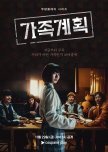
A Captivating Start That Leaves You Wanting More
This is a gem of a six-episode drama that delivers humor, heart, and an engaging story with no wasted moments. From the phenomenal transitions to the well-paced storytelling, the series ensures viewers are never confused, making it easy to dive into the narrative.The humor is a highlight—every joke lands perfectly, often leaving you in fits of laughter. Coupled with a stacked cast, nice family interactions, and a great soundtrack, the show keeps you entertained from start to finish.
As the final episode ends, you’re left craving more. This feels like just the beginning, and a second season or continuation is a must. This drama is a delightful appetizer that promises even greater things to come.
Was this review helpful to you?
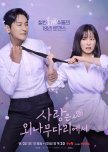
A Midlife Romcom That Feels Middle School
When you see the names "CJ ENM" and "Studio Dragon" flash across the screen in the opening credits, you know you’re in for a visual and technical treat. True to form, Love Your Enemy delivers on production quality, with polished cinematography and meticulous attention to detail. The music, too, is a standout, boasting contributions from some of the biggest names in the industry, making the OST a highlight of the drama.The series starts strong, peppered with laugh-out-loud moments that genuinely catch you off guard. The humor, especially in the early episodes, keeps the tone light and engaging. However, as the narrative unfolds, it becomes clear that Love Your Enemy is, at its core, a textbook romcom.
Unfortunately, the drama leans heavily on tired tropes. The depiction of characters—despite being in their 40s—sometimes feels juvenile, bordering on cringeworthy. The frequent reliance on the "adults acting like middle schoolers" cliché detracts from the emotional depth that one might expect from a series with mature protagonists.
Midway through, I found myself hoping for a pivot—a moment where the story would rise above its predictable beats and offer something refreshing or profound. Sadly, that moment never came. While it’s not a bad drama by any means, it fails to leave a lasting impression, playing it safe within the confines of its genre.
Love Your Enemy is an easy watch for those seeking light entertainment with high production values and catchy music. But for viewers craving depth or a fresh take on romance, it might feel like a missed opportunity.
Was this review helpful to you?

Like Eavesdropping on Real Life—But with a Great Soundtrack
This is a breath of fresh air in the world of Chinese dramas. It strips away the usual over-the-top melodrama and instead offers a naturalistic, almost documentary-like experience. The series feels as if the creators simply placed a camera in the midst of interconnected people and let their lives unfold, accompanied by a beautifully curated soundtrack that enhances the realism.One of the standout aspects of the drama is its mature and authentic dialogue. Conversations flow naturally, avoiding the exaggerated emotions and forced conflicts often found in mainstream dramas. The decision not to censor brand names and locations adds another layer of realism, making the world of Begin Again feel lived-in and genuine. The way the show presents each character’s childhood or background through fast photo animations is particularly effective, providing depth and context in a visually engaging way.
A unique aspect of Begin Again is its approach to storytelling. Rather than focusing on a single protagonist or a central romance, the drama treats every character as the lead of their own life. While some viewers have criticized the introduction of new characters towards the end—arguing that it detracts from the original cast—I see it differently. Life is constantly evolving, and people come and go. The show captures this beautifully, even if some storylines are more compelling than others.
Ultimately, This is a calm, relaxing watch, free from the usual overused drama tropes. It’s a slice-of-life series that embraces the beauty of everyday interactions, making it a truly pleasant and refreshing experience. If you’re looking for something grounded, thoughtful, and effortlessly real, this drama is well worth your time.
Was this review helpful to you?

Twirl, Smile, Repeat
Just Dance is a delightful and heartfelt coming-of-age drama that kicks off with a strong start, thanks to its perfectly cast actors and an insanely good soundtrack. The music is not only charming but also uplifting, often leaving you smiling as it complements the show’s tone beautifully.The drama stands out for its unique and fun approach to storytelling, though the occasional use of color correction filters can feel slightly off-putting. Despite this minor visual hiccup, the direction and camera work are excellent, reminiscent of the style seen in Into the Ring. The creative angles and thoughtful framing enhance the emotional beats of the story, making the viewing experience all the more engaging.
Park Se Wan shines as the lead, delivering a remarkable performance, especially impressive given that this is her first Lead role. She brings depth and relatability to her character, capturing the struggles and joys of youth with authenticity.
As a slice-of-life drama, Just Dance excels in portraying the nuances of friendships, dreams, and young love. The romance is sweet and often adorable, though it occasionally dips into darker, more poignant territory. These moments of sadness are balanced by the show's overall warmth, making it a touching exploration of growth and resilience.
While the title Just Dance might suggest a heavy focus on dancing, the drama takes a different route. Dancing serves more as a backdrop, a shared activity that brings the characters together, rather than the central theme. The show doesn’t delve deeply into the technicalities or artistry of dance but instead uses it as a metaphor for perseverance, self-expression, and the pursuit of dreams. This subtle approach allows the story to prioritize its heartfelt exploration of relationships, personal growth, and the struggles of youth, making it resonate on a deeper level beyond the surface of its title.
In essence, Just Dance is a charming, bittersweet drama with endearing characters, strong friendships, and an unforgettable OST. It’s a must-watch for fans of coming-of-age stories and anyone looking for a mix of joy, heartbreak, and hope.
Was this review helpful to you?

A Thrilling Surprise That Redefines the Genre
When I started A Shop for Killers, I had no idea what I was getting into. From the title alone, I imagined a run-of-the-mill battle royale scenario—maybe people trapped in a shopping mall, fighting for survival. But what I got was something far more innovative and gripping.The series masterfully combines its intense storyline with outstanding technical elements. The use of music is nothing short of incredible, amplifying every emotion and heightening the suspense at just the right moments. It’s clear that a lot of thought went into the sound design, and it pays off in spades.
The cinematography is another standout aspect. The creative camera shots add a layer of visual storytelling that keeps you hooked from episode to episode. While there’s a minor slip-up with the ropes in Episode 3—a noticeable rookie mistake—it’s easy to overlook given the overall quality of the production.
By the end of Season 1, I was completely hooked and eagerly anticipating Season 2. If it can match—or even surpass—the brilliance of the first season, we’re in for an unforgettable ride.
A Shop for Killers is a must-watch for anyone who loves a fresh, creative take on thrillers. It’s intense, stylish, and leaves you craving more.
Was this review helpful to you?
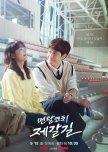
This review may contain spoilers
An Underwhelming "Sports" Drama That Stretches Credibility More Than Bands
While marketed as a sports drama, this series surprisingly lacked any substantial depiction of sports across its 16 episodes, save for a few scenes of band stretching. The comedy felt dry and uninspired, failing to inject the light-hearted moments one might expect.The plot leaned heavily on a tired and overused trope in K-dramas—the omnipotent and corrupt assemblyman controlling everything from the shadows. This overplayed narrative device detracted from the story's originality and felt almost insulting in its predictability.
To its credit, the writing in the first six episodes was reasonably solid, showing potential that unfortunately wasn't sustained. However, the inclusion and persistence of a rapist and assailant "coach" character until the very end was baffling and deeply problematic. This narrative choice felt unnecessary and undermined the drama’s credibility, leaving a sour taste.
Although I avoided comparing this drama to Love All Play, doing so would inevitably result in a harsher critique. That said, the romance subplot was passable for most of the series, but the final episode completely derailed it, leaving an unsatisfying conclusion.
Despite my initial instincts to skip this drama for two years—instincts that now feel validated—I committed to watching it in its entirety. Under normal circumstances, I would have dropped it early on.
In summary, this drama's flaws—its lack of authentic sports representation, clichéd tropes, and questionable character choices—overshadowed its brief moments of decent writing. The key takeaway? Avoid comparisons to Love All Play to preserve what little goodwill remains.
Was this review helpful to you?

A Knockout Drama That Hits All the Right Notes
Every so often, a show comes along that completely blindsides you, and Boyhood is exactly that kind of drama. Before stumbling upon it, I had no idea it even existed, but now, I can confidently say it’s a hidden gem that deserves all the praise it can get.First and foremost, Boyhood showcases the extraordinary acting talent of Yim Siwan, who delivers a performance that is nothing short of breathtaking. His ability to embody his character with such depth and authenticity is awe-inspiring. And he’s not alone—the entire cast is phenomenal, each actor bringing their A-game to create a tapestry of unforgettable moments.
The director, whose work I wasn’t familiar with before this, deserves immense credit for the show’s stunning cinematography. Every scene feels meticulously crafted, with emotions brought vividly to life through the synergy of strong performances and masterful direction. Whether it’s comedy that genuinely makes you laugh, moments of frustration that hit hard, or heartbreak that leaves you gutted, Boyhood makes sure you feel every beat of its emotional spectrum.
One standout aspect is the fight scenes. They’re choreographed and filmed with such precision and artistry that they’re as much a visual treat as they are emotionally engaging. Adding to the experience is the show’s outstanding music, which elevates every scene to new heights. And let’s not forget the unexpected romance—it’s surprising how a non-romance drama manages to portray love better than many shows dedicated to the genre.
Another delightful touch is how each episode is named after legendary movies and TV shows. It’s a clever nod to pop culture that adds a layer of charm and personal connection for viewers like me, who couldn’t help but smile at the thoughtfulness behind it.
Boyhood has set the bar high, and I’m already seated and ready for season two. If the next installment is anything like the first, we’re in for another masterpiece. Bravo to everyone involved in this incredible drama!
Was this review helpful to you?

Ok, That Was an Emotional Rollercoaster
As someone who rarely ventures into historical dramas, The Tale of Lady Ok was an unexpected yet enthralling watch. From the very first episode, I was completely drawn in—there’s an incredible amount happening, yet the storytelling remains well-paced and engaging. Despite the extended 70-minute+ episode format, the drama never felt sluggish or overindulgent, at least in its early episodes. Instead, the pacing, performances, and emotionally charged narrative made for an immersive viewing experience.One of the drama’s biggest strengths lies in its cast. The performances are nothing short of remarkable, breathing life into the characters and their struggles. The emotional depth in certain scenes is striking, making it impossible not to be invested in Lady Ok’s journey. Accompanying these powerful moments is an absolutely stunning OST, featuring some of the most well-respected artists in the industry. The music not only elevates the drama’s emotional weight but also enhances its overall atmosphere beautifully.
However, while the series starts off strong, it gradually loses some of its initial momentum. Around the midway point, the tightly woven narrative begins to feel stretched out, and the drama starts to drag. The later episodes feel less focused, as if the story is no longer centered on Lady Ok alone. Perhaps a 12- or 14-episode structure, maintaining the early pacing, would have resulted in a more consistently gripping experience.
Despite this, The Tale of Lady Ok remains a compelling watch, especially for those who appreciate well-crafted historical dramas with emotional depth. And a happy ending for a change!
Was this review helpful to you?

Death's Game: Where Style Outplays Substance
"Death's Game" is a visually stunning K-drama that draws viewers in with its high production value and creative cinematography. The introduction is refreshingly concise, setting the stage without unnecessary exposition. The use of inventive camera angles, particularly the POV shots, adds a unique and engaging dimension to the viewing experience. These technical elements, combined with a parade of impressive guest appearances, make the show a feast for the eyes.While the production shines, the writing and storytelling fall into more conventional territory. The narrative is serviceable—neither groundbreaking nor particularly deep. It has its share of plot holes and moments that defy logic, but these flaws don’t detract too much from the overall experience. If anything, the show’s charm lies in its ability to keep things entertaining despite its narrative shortcomings.
The first part of the series stands out as stronger in terms of writing, setting a solid foundation before the second half loses some of its momentum. Even so, the show never stops being enjoyable. "Death's Game" leans heavily on its aesthetic appeal and star-studded cameos to keep audiences hooked, and it succeeds in that regard.
In the end, "Death's Game" isn’t a masterpiece of storytelling, but it’s undeniably fun to watch. If you’re looking for an eye-candy drama with creative visuals and an engaging cast, this one is worth a try. Just don’t expect it to redefine the genre.
Was this review helpful to you?
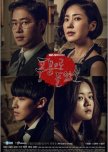
A Rollercoaster of Satire, Drama, and Frustration
Heard It Through the Grapevine is a drama that boldly kicks off with a strong, gripping premise, immediately immersing viewers in its sharp satire and intense family dynamics. However, while the opening episodes shine with energy and intrigue, the series gradually loses steam as it progresses, particularly in the middle stretch, where the narrative seems to meander. That said, the show manages to fill its hefty 30-episode runtime without feeling overly padded—a commendable feat in itself.One of the drama’s standout strengths is its masterful tonal balance. Few shows can oscillate between laugh-out-loud comedy and moments of heart-wrenching seriousness as seamlessly as this one does. This duality keeps the audience engaged, even when the plot occasionally falters. The ability to tackle heavy themes like family expectations, societal hypocrisy, and class divides while maintaining an undercurrent of humor is where this drama truly excels.
The production quality is impressive, especially for a 2015 series. Save for the occasional sound clipping during shouting scenes, the visuals, direction, and overall execution feel polished and modern. The music, while excellent, is sparse—more tracks would have enhanced the emotional depth of the longer runtime.
The characters are a mixed bag, with the male lead’s parents emerging as the ultimate villains—unbearably out of touch with reality and masters of deflection. Their treatment of Seo Bom, the drama’s central character in my eyes, is particularly frustrating. The absurdity of blaming her for everything, from adultery to workplace strikes to the proverbial end of the world, becomes a recurring theme that borders on exhausting. While this blame-game dynamic is likely intended to highlight the absurdity of their privilege and prejudice, it can feel repetitive and draining by the latter half of the series.
The subplot involving workplace politics is another weak point. It often feels disconnected from the more engaging family drama and personal conflicts. However, the side characters are handled well, with just enough screen time to add depth without overstaying their welcome.
Despite its flaws, Heard It Through the Grapevine delivers a satisfying emotional arc, with the final episode standing out as one of the series’ best. Alongside the stellar first episode, it bookends the story with poignant, memorable moments that linger long after the credits roll.
In conclusion, while the middle episodes sag under the weight of repetitive conflicts and misplaced blame, the drama’s sharp humor, emotional resonance, and strong start and finish make it worth the watch. It may test your patience at times, but its highs more than make up for its occasional lows. If you’re ready for a rollercoaster of laughter, frustration, and heartfelt moments, Heard It Through the Grapevine won’t disappoint.
Was this review helpful to you?
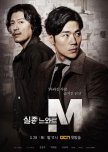
A decent effort, but it didn’t manage to hold my attention.
Missing Noir M begins with a strong opening case, offering an intriguing premise that draws viewers in. While some of the plot points lack logical consistency, they are easy to overlook for those simply seeking a compelling crime drama. Despite its promising start, however, the series struggles to maintain its appeal.The second and third cases, though not slow or poorly paced, may feel underwhelming to viewers who value unpredictability. The outcomes of each case are often clear within the first few minutes, which diminishes the tension and suspense. As a result, the episodes can feel much longer than they actually are, particularly for those who find themselves disconnected from the narrative.
On the technical side, the drama delivers competent but unremarkable directing and music. While serviceable, these elements fail to add the distinctiveness or emotional depth needed to elevate the overall experience.
Ultimately, This drama may appeal to fans of straightforward procedural dramas, but it falls short of being truly memorable. Its predictable case resolutions and lack of standout elements make it a tough recommendation for those seeking a more gripping or dynamic series.
Was this review helpful to you?

Why Is No One Talking About This?
How is it that a drama with such a stacked cast has flown so under the radar? I didn’t even know A Bloody Lucky Day existed until I stumbled upon it by accident—and that in itself feels almost criminal.This is suspense in its purest form. From the moment the show begins, the tension is suffocating. The cinematography, the pacing, the eerie, pulse-pounding score—every single element is designed to keep you on edge. And then there’s the performances. My god, the performances. This cast doesn’t just act; they completely embody their roles, delivering some of the most intense, nerve-wracking, and emotionally charged portrayals I’ve seen in a long time.
The show’s structure is another stroke of brilliance. The main events unfold over just 4.5 hours in-universe, interwoven with flashbacks and an aftermath that lingers like an emotional bruise. Over 10 episodes, it crafts a masterclass in tension while still leaving room for deeper emotional beats. And when that final song plays? It’s not just an ending—it’s a release. Tears fall, not just from sorrow or relief, but from the overwhelming satisfaction of witnessing something this well-executed.
Was this review helpful to you?

Light, Love, and Shadows: The Unforgettable Journey of Definitely Not Today
Definitely Not Today is a refreshingly offbeat and captivating C-drama that defies conventional storytelling. From the very first episode, it exudes a cinematic charm reminiscent of Amélie. While it may not match the visual or directorial sophistication of that classic, it captures a similar whimsical yet poignant essence, creating an experience that feels more like watching a film than a traditional drama.The narrative starts light and quirky, with a playful energy underscored by a delightful soundtrack that perfectly complements its tone. But beneath its cheerful surface lies a deeply introspective story, tackling heavy and often uncomfortable themes. At its heart, the show is about a man grappling with despair and contemplating what one might call the "Osamu Dazai special." As the story unfolds, it takes a darker turn, delving into profound and unsettling territory while still maintaining a delicate balance with moments of levity.
One of the drama’s standout features is its approach to romance. Surprisingly, the chemistry between the leads feels more genuine and compelling than in many romance-focused dramas. Their connection is natural, understated, and deeply human, a testament to the stellar performances of the cast. The leads bring nuance and authenticity to their roles, making their journey together as impactful as the heavier themes the show explores.
What makes Definitely Not Today so gripping is its ability to pull you in completely. Initially intended as a casual watch during breaks, it became impossible to put down, compelling a binge-worthy experience. For cinephiles, the film references sprinkled throughout are an added treat, showcasing a love for cinema that resonates with viewers who appreciate the art form.
Despite its darker turns, the drama offers a satisfying and hopeful resolution, leaving viewers with a sense of closure and warmth. Definitely Not Today is a rare gem—a drama that dares to be unconventional, thought-provoking, and deeply moving, all while maintaining a unique charm. It’s a must-watch for anyone seeking something different, something that stays with you long after the credits roll.
Was this review helpful to you?












